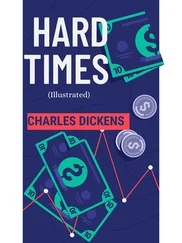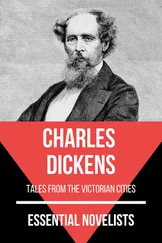“What a comical brother-in-law old Bounderby is, I think you mean,” said Tom.
“You are a piece of caustic, Tom,” retorted Mr. James Harthouse.
There was something so very agreeable in being so intimate with such a waistcoat; in being called Tom, in such an intimate way, by such a voice; in being on such off-hand terms so soon, with such a pair of whiskers; that Tom was uncommonly pleased with himself.
“Oh! I don't care for old Bounderby,” said he, “if you mean that. I have always called old Bounderby by the same name when I have talked about him, and I have always thought of him in the same way. I am not going to begin to be polite now, about old Bounderby. It would be rather late in the day.”
“Don't mind me,” returned James; “but take care when his wife is by, you know.”
“His wife?” said Tom. “My sister Loo? O yes!” And he laughed, and took a little more of the cooling drink.
James Harthouse continued to lounge in the same place and attitude, smoking his cigar in his own easy way, and looking pleasantly at the whelp, as if he knew himself to be a kind of agreeable demon who had only to hover over him, and he must give up his whole soul if required. It certainly did seem that the whelp yielded to this influence. He looked at his companion sneakingly, he looked at him admiringly, he looked at him boldly, and put up one leg on the sofa.
“My sister Loo?” said Tom. “She never cared for old Bounderby.”
“That's the past tense, Tom,” returned Mr. James Harthouse, striking the ash from his cigar with his little finger. “We are in the present tense, now.”
“Verb neuter, not to care. Indicative mood, present tense. First person singular, I do not care; second person singular, thou dost not care; third person singular, she does not care,” returned Tom.
“Good! Very quaint!” said his friend. “Though you don't mean it.”
“But I do mean it,” cried Tom. “Upon my honour! Why, you won't tell me, Mr. Harthouse, that you really suppose my sister Loo does care for old Bounderby.”
“My dear fellow,” returned the other, “what am I bound to suppose, when I find two married people living in harmony and happiness?”
Tom had by this time got both his legs on the sofa. If his second leg had not been already there when he was called a dear fellow, he would have put it up at that great stage of the conversation. Feeling it necessary to do something then, he stretched himself out at greater length, and, reclining with the back of his head on the end of the sofa, and smoking with an infinite assumption of negligence, turned his common face, and not too sober eyes, towards the face looking down upon him so carelessly yet so potently.
“You know our governor, Mr. Harthouse,” said Tom, “and therefore, you needn't be surprised that Loo married old Bounderby. She never had a lover, and the governor proposed old Bounderby, and she took him.”
“Very dutiful in your interesting sister,” said Mr. James Harthouse.
“Yes, but she wouldn't have been as dutiful, and it would not have come off as easily,” returned the whelp, “if it hadn't been for me.”
The tempter merely lifted his eyebrows; but the whelp was obliged to go on.
“I persuaded her,” he said, with an edifying air of superiority. “I was stuck into old Bounderby's bank (where I never wanted to be), and I knew I should get into scrapes there, if she put old Bounderby's pipe out; so I told her my wishes, and she came into them. She would do anything for me. It was very game of her, wasn't it?”
“It was charming, Tom!”
“Not that it was altogether so important to her as it was to me,” continued Tom coolly, “because my liberty and comfort, and perhaps my getting on, depended on it; and she had no other lover, and staying at home was like staying in jail—especially when I was gone. It wasn't as if she gave up another lover for old Bounderby; but still it was a good thing in her.”
“Perfectly delightful. And she gets on so placidly.”
“Oh,” returned Tom, with contemptuous patronage, “she's a regular girl. A girl can get on anywhere. She has settled down to the life, and she don't mind. It does just as well as another. Besides, though Loo is a girl, she's not a common sort of girl. She can shut herself up within herself, and think—as I have often known her sit and watch the fire—for an hour at a stretch.”
“Ay, ay? Has resources of her own,” said Harthouse, smoking quietly.
“Not so much of that as you may suppose,” returned Tom; “for our governor had her crammed with all sorts of dry bones and sawdust. It's his system.”
“Formed his daughter on his own model?” suggested Harthouse.
“His daughter? Ah! and everybody else. Why, he formed Me that way!” said Tom.
“Impossible!”
“He did, though,” said Tom, shaking his head. “I mean to say, Mr. Harthouse, that when I first left home and went to old Bounderby's, I was as flat as a warming-pan, and knew no more about life, than any oyster does.”
“Come, Tom! I can hardly believe that. A joke's a joke.”
“Upon my soul!” said the whelp. “I am serious; I am indeed!” He smoked with great gravity and dignity for a little while, and then added, in a highly complacent tone, “Oh! I have picked up a little since. I don't deny that. But I have done it myself; no thanks to the governor.”
“And your intelligent sister?”
“My intelligent sister is about where she was. She used to complain to me that she had nothing to fall back upon, that girls usually fall back upon; and I don't see how she is to have got over that since. But she don't mind,” he sagaciously added, puffing at his cigar again. “Girls can always get on, somehow.”
“Calling at the Bank yesterday evening, for Mr. Bounderby's address, I found an ancient lady there, who seems to entertain great admiration for your sister,” observed Mr. James Harthouse, throwing away the last small remnant of the cigar he had now smoked out.
“Mother Sparsit!” said Tom. “What! you have seen her already, have you?”
His friend nodded. Tom took his cigar out of his mouth, to shut up his eye (which had grown rather unmanageable) with the greater expression, and to tap his nose several times with his finger.
“Mother Sparsit's feeling for Loo is more than admiration, I should think,” said Tom. “Say affection and devotion. Mother Sparsit never set her cap at Bounderby when he was a bachelor. Oh no!”
These were the last words spoken by the whelp, before a giddy drowsiness came upon him, followed by complete oblivion. He was roused from the latter state by an uneasy dream of being stirred up with a boot, and also of a voice saying: “Come, it's late. Be off!”
“Well!” he said, scrambling from the sofa. “I must take my leave of you though. I say. Yours is very good tobacco. But it's too mild.”
“Yes, it's too mild,” returned his entertainer.
“It's—it's ridiculously mild,” said Tom. “Where's the door! Good night!”
“He had another odd dream of being taken by a waiter through a mist, which, after giving him some trouble and difficulty, resolved itself into the main street, in which he stood alone. He then walked home pretty easily, though not yet free from an impression of the presence and influence of his new friend—as if he were lounging somewhere in the air, in the same negligent attitude, regarding him with the same look.
The whelp went home, and went to bed. If he had had any sense of what he had done that night, and had been less of a whelp and more of a brother, he might have turned short on the road, might have gone down to the ill-smelling river that was dyed black, might have gone to bed in it for good and all, and have curtained his head for ever with its filthy waters.
Читать дальше
Конец ознакомительного отрывка
Купить книгу












